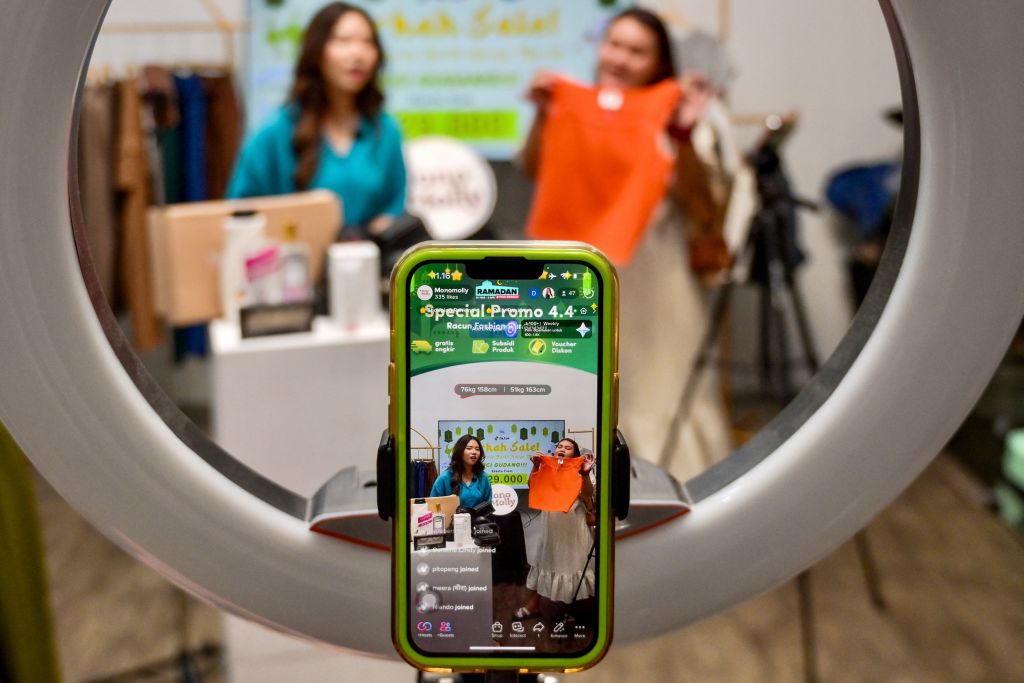
TikTok’s ambition to expand in online shopping is facing a major blow from new rules in Indonesia that are set to curb its operations in its biggest e-commerce market.
Indonesia is prohibiting social media companies from facilitating direct e-commerce payments on their platforms, Trade Minister Zulkifli Hasan said Monday. The move, directed at ByteDance Ltd.’s TikTok, means companies will only be able to advertise products but not conduct direct transactions.
The rule is part of newly tightened trade regulations that could be introduced as soon as Tuesday by the Ministry of Trade. The policy seeks to keep Indonesia’s 64.2 million micro, small and medium enterprises that contribute 61% of its gross domestic product from being squeezed out by social commerce companies. Currently, TikTok is the only social media company that allows direct e-commerce transactions on its platform.
Read More: TikTok Sparks Inspiration—And Pressure—As Students Shop For School
Indonesia is the first and biggest market for TikTok Shop, and online shopping has become the app’s fastest-growing feature with a burgeoning fan base in the country. TikTok is betting on Indonesia as a blueprint to expand into other online-shopping markets, including the US.
With the new rule, Indonesia will be the first among countries in Southeast Asia to push back against TikTok.
Navigating this conflict with Indonesia will be pivotal for the company as governments across the world assess how Southeast Asia’s largest nation moves to curb the social media giant’s burgeoning e-commerce presence, just months after the firm said it will invest billions of dollars into the region. TikTok is already facing possible bans and scrutiny in the likes of the US, Europe and India on national security concerns.
Read More: What to Know About the TikTok Security Concerns
TikTok has pushed back against the proposed policy. It argues that separating social media and e-commerce into different platforms not only hampers innovation but also disadvantages millions of its Indonesian merchants and consumers. The company says some of them rely on its platform to make a living.
“Social commerce was born to solve a real world problem for local traditional small sellers, by matching them with local creators who can help drive traffic to their online shops,” a TikTok Indonesia spokesperson said in a statement. “While we respect local laws and regulations, we hope that the regulations take into account its impact on the livelihoods of more than 6 million sellers and close to 7 million affiliate creators who use TikTok Shop.”
Traditional online retailers, meanwhile, would benefit from restrictions on TikTok Shop. Shares of Sea Ltd., whose Shopee unit is an online-shopping leader in Indonesia, surged 12% in New York trading Monday. GoTo Group, parent of online retailer Tokopedia, advanced as much as 5.8% in early Jakarta trading.
What Bloomberg Intelligence Says
TikTok’s possible split of e-commerce and social media operations in Indonesia could impede further conversion of its 125 million local monthly active users (MAU) into shoppers, benefiting Sea’s Shopee, which, like TikTok Shop, relies on beauty and personal care for most of its domestic sales. GoTo’s Tokopedia, which had 34 million MAU in August vs. Shopee’s 138 million and Alibaba-owned Lazada’s 37 million, should be better able to defend its GMV share in Indonesia, which drove 90% of the group’s 2022 sales. —Nathan Naidu, analyst
More Must-Reads from TIME
- Donald Trump Is TIME's 2024 Person of the Year
- Why We Chose Trump as Person of the Year
- Is Intermittent Fasting Good or Bad for You?
- The 100 Must-Read Books of 2024
- The 20 Best Christmas TV Episodes
- Column: If Optimism Feels Ridiculous Now, Try Hope
- The Future of Climate Action Is Trade Policy
- Merle Bombardieri Is Helping People Make the Baby Decision
Contact us at letters@time.com